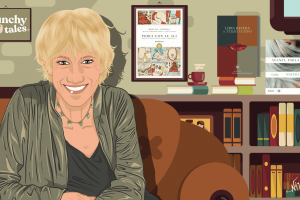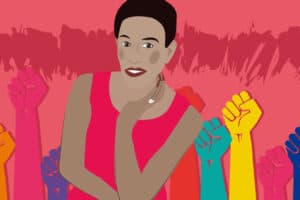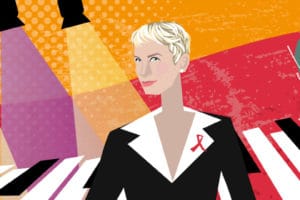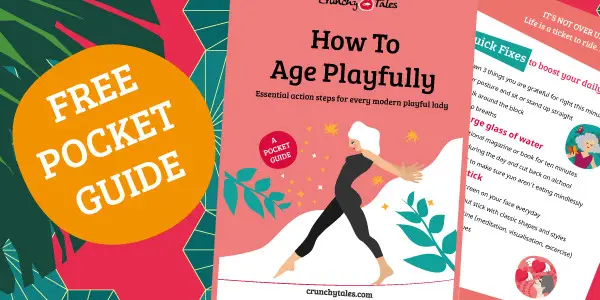Meet Chiara Turozzi and Hanna Suni, the new wave of feminist publishing
Two different backgrounds, one main goal: highlighting the genius of women as writers, readers, illustrators, members of an editorial community. Sisterhood exists in midlife; Chiara Turozzi and Hanna Suni are the perfect examples of how to combine great expertise with the wisdom and resilience only ‘mature’ women possess. Both in their 40s, they decided it was time to follow their passion and set-up their own business.
Chiara Turozzi, the editor of ‘L’Iguana‘, an Italian niche feminist publishing house based in Verona, has written about philosophy and literary criticism for feminist magazines and newspapers before launching her editorial project. Hanna Suni, graphic designer and Art Director of ‘L’Iguana’, owner of Hame Design Studio, moved to Italy from Finland to work in public relations, marketing and communication. When they met, they turned their partnership into a mission: “encouraging all women to stand up and applaud each other, recognising and promoting the talent of our sisters”.
What kind of vision did you have when you started a publishing house that focuses exclusively on women? And how successful have you been in realising that vision to date?
From the very beginning, we wanted to showcase and highlight the talent, strength and genius of women as writers, readers, illustrators, members of an editorial community. As we have gotten to know each other and our audience and reference groups better, we have adjusted the editorial plan as well as the graphics style that distinguishes our publishing house. The main vision of feminism guides us since the first days, although we always have our antennas out to track new ideas and tendencies.
Running a feminist publishing house must be difficult, especially in Italy. What kind of challenges did you face and how successful were you in overcoming those?
We consider being a niche publishing house with a well-defined mission an advantage. We are not competing against the giants of our industry and in the context of smaller publishing houses, we have our own specific role and target market. There are many literary circles, bookstores and associations that are dedicated to women’s literacy and this has helped us create a network of women that empowers and supports each other joyously. It is a fruitful exchange for everyone and one of the cornerstones of feminist philosophy.
How did you come up with the name ‘L’Iguana’ for your publishing? Did the animal have any personal significance to you?
At the beginning of the sixties, when Doris Day interpreted ‘The Thrill of It All’, Betty Friedan wrote ‘The Feminine Mystique’ and a generation of women was trying to come to terms with a new symbolic order, Neapolitan writer Anna Maria Ortese invented a creature, half woman half beast, to give a name to the female transcendence: Iguana, starved for good food and compelling words and stories. The name of our publishing house is also a tribute to a famous Italian publishing house, which has inspired many of us and which is named after another reptile: La Tartaruga (the tortoise) by Laura Lepetit.
You are both in your 40s. How does it feel to cross a line and leave your youth behind: a challenge, a relief, a liberation?
All of the above! Managing the daily routine of the ‘rush-years’, work, family (we both have two boys aged 10 to 14), household and all the other activities like yoga and music lessons can be challenging. But with the maturity of being 42 and 44, we are much more relaxed and don’t go into panic mode if the family eats pizza for two nights in a row or the beds are not made until noon. We are very comfortable in our forties, feeling strong, secure yet still playful.
Do you think the wisdom of middle age has changed the way you approach your work?
Knowing ourselves better makes us more secure and aware of what we like and don’t like, what gratifies us and suits our mission. We are also more courageous in choosing and exposing our communication strategy.
How do you choose stories to be published?
Thanks to the maturity we have reached, we have changed our selection procedures and are now actively searching for writers that seem interesting to us, coming from various fields of narration; cinema, theatre, science-fiction among the more traditional ones. We contact writers that we think would suit L’Iguana and have interesting stories to tell. In selecting the materials, in addition to the text itself, we take into consideration the way the manuscript is presented and the writer’s personal story. And, we trust our feminine instinct.
We believe in the late bloomers factor. A lot of women discover a new passion, like writing, later in life and most of them are brilliant. What would you suggest them on how to approach a publisher and how to work on their manuscript? Can you talk a bit about your editing process?
Middle-aged women who discover new passions or completely revamp their lives are an inspiration to us. A piece of advice to those who approach writing for the first time? Be careful. The internet offers aspiring writers easily accessible opportunities and quick services like self-publishing or writing workshops that promise to convey secrets and techniques that transform you into queens of literature overnight. Sometimes aspiring writers have such a strong desire to declare themselves writers that they confuse this easy accessibility to publishing with an effective public consensus. Be severe and critical of yourselves, read and read again the classics of great women writers and beautiful stories of our contemporary novelists. And publish only with someone who really invests in you and your book.
Your books are beautifully illustrated. What are you trying to achieve with your bold designs? And how long does it generally take, from the first ideas to the finished thing?
The main goal is naturally to attract attention, interest and awe. Our cover background is simple and white; this leaves space for bold designs. The front cover must catch the eye and be connected to the title, ideally accompanying it and adding something new and exciting to the equation. Once the title of the book is determined, we start writing down ideas, drawing sketches and searching for inspiration. There is always a phase where we bounce ideas back and front with the writer and our editorial community, families included. Sometimes we transform existing designs – paintings for example – into something “pop”, ironic and modern. Altogether it almost always takes months from the first ideas to the final cover.
What are your plans for the future?
In March 2019 we registered a new trademark, “Feminist you” that inaugurates a series of non-fiction literacy. The concept of ‘Feministing’ the world around us is fundamental in our daily lives and relationships, all the choices we make. We’d like our audience, from young girls to women our age and older, adopted it as well. We will continue to publish translations of unpublished classics by great writers such as Charlotte Brontë, Louisa May Alcott and George Sand. We are publishing letters by Mary Wollstonecraft for Christmas 2019, in pop-version as all our classic Iguanas. We are also keen on expanding our network of female communities, such as the new connection with CrunchyTales. We find the idea of learning from each other very uplifting.
Are you happy with the work that you’ve done so far?
We have no regrets and have learned a lot, both from our successes and our mistakes. Every book we publish is like a child that learns to walk on its own two feet and we are proud of all our Iguanas, as well as our community.
What advice do you have for feminists in their middle age who want to hear (or want to make heard) their voices?
For us, being a feminist means committing ourselves to highlight the presence and talent of other women, on every occasion. Everything that happens to other women is about us; the battles and conquests, the successes and injustices suffered by other women are also ours. Just like Frances McDormand at the Oscars, we’d like to encourage all women to stand up and applaud each other! Recognising and promoting the talent of our sisters’ and helping them tell their story will make us all heard and known.






